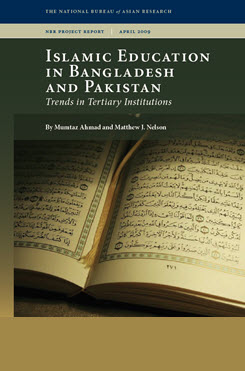Madrasa Reforms and Perspectives
Islamic Tertiary Education in Pakistan
Building on previous years’ research, this paper examines recent developments in madrasa reform initiatives throughout Pakistan while looking further into the alleged relationship between madrasa education and extremist tendencies. The report assesses the largely negative attitudes of madrasa ulama and their students toward the United States, in general, and their hostile views of U.S. aid to Pakistan and U.S. foreign policy in the Muslim world, in particular. The paper concludes with an overview of the relation between madrasas and the question of national and Islamic identity in Pakistan.
EXECUTIVE SUMMARY
MAIN FINDINGS
The Pakistani madrasa curriculum remains virtually unchanged. The government blames madrasa authorities for the failure of its reforms. However, these reforms were prepared in haste by government officials with little understanding of traditional education, and without any input from the madrasa ulama. The ulama’s opposition to these reforms was then used by the government to excuse its lack of commitment. Madrasa curriculum may be said to have played a role in creating an environment that encourages hostile or, at least, negative attitudes toward the “other.” However, to claim that there is a direct causal relationship between madrasa education, on the one hand, and anti-Americanism or anti-Westernism, on the other, is, at best, a tenuous proposition. Madrasa education per se is entirely devoid of political content. With the same curriculum, madrasa students were never shown to be anti-American until the 1990s. Furthermore, anti-Americanism is not something that is exclusively confined to the madrasas or, for that matter, to Muslims alone. The Bush administration’s policies in the Middle East; the U.S. invasion and occupation of Afghanistan and Iraq; the scandals of Abu Ghraib and Guantanamo Bay; the widely-reported stories of torture and “extraordinary renditions;” and the general perception that the “global war on terror” is primarily directed against Muslims have all irreparably damaged the moral standing of the United States in the eyes of Muslims. There is now a great deal of pessimism among the madrasa ulama who largely feel that the situation will not “change for the better.” Given their highly negative and hostile views of America, it is no wonder that 76 percent of madrasa students and teachers questioned believe that “waging jihad against America” is justified.
POLICY IMPLICATIONS
- A large majority of madrasa students and teachers believes that U.S. non-interference in the affairs of Muslim countries and its withdrawal from Afghanistan and Iraq will prove to be the most critical factors for improving relations between the United States and the Muslim world.
- Among madrasa ulama, there is a noticeable lack of enthusiasm for U.S. economic assistance to Muslim countries. Many believe that the United States and the West attempt to control the policies of Muslim countries through aid. This finding should give pause to policymakers who believe that religiously-inspired unrest, extremism, and militancy in the troubled areas of northern Pakistan can be tackled by the infusion of economic aid.


